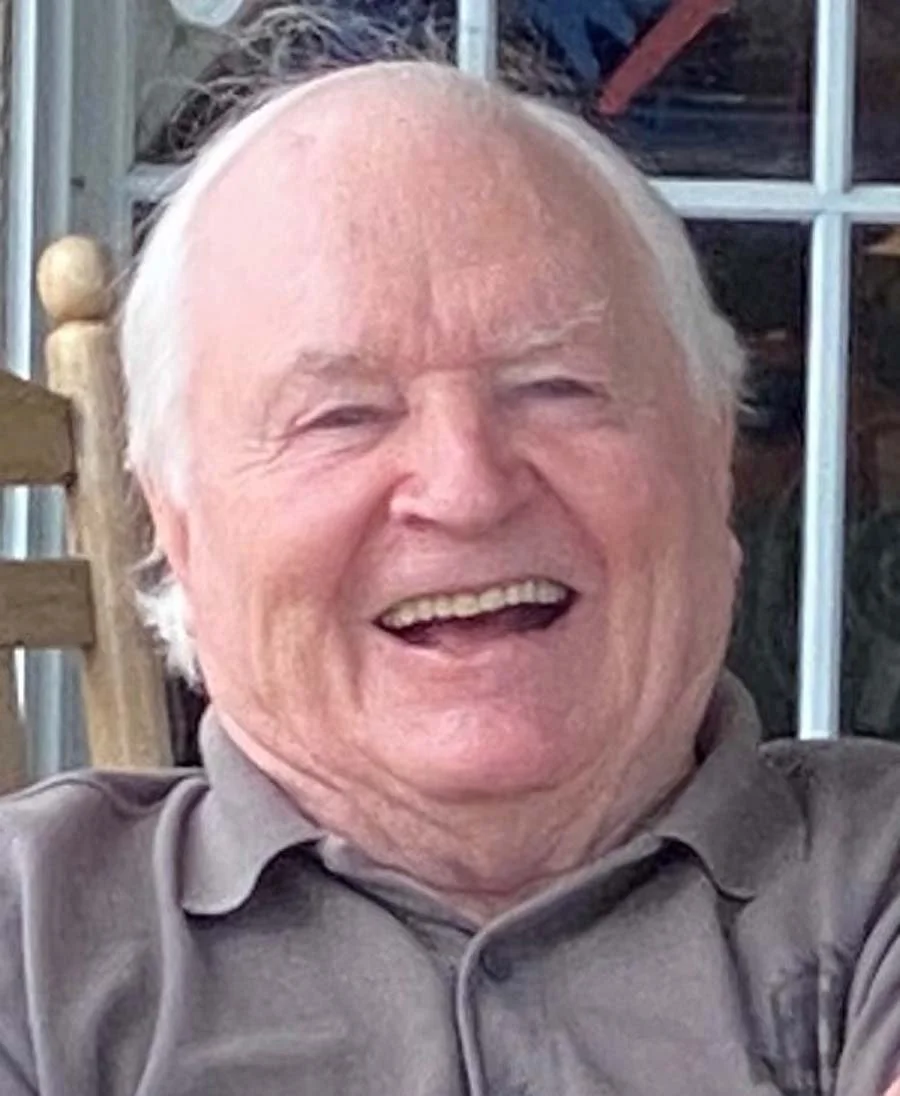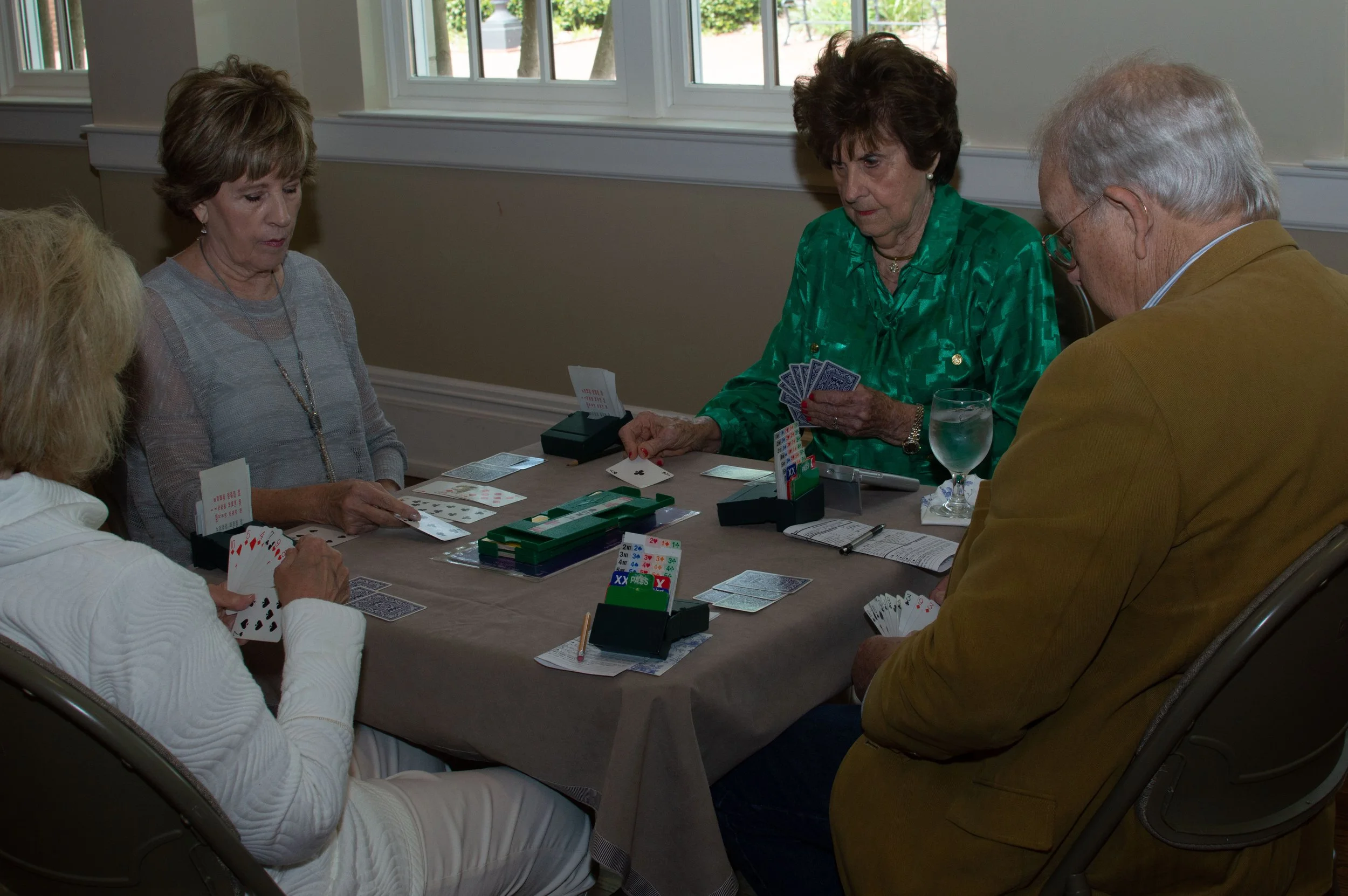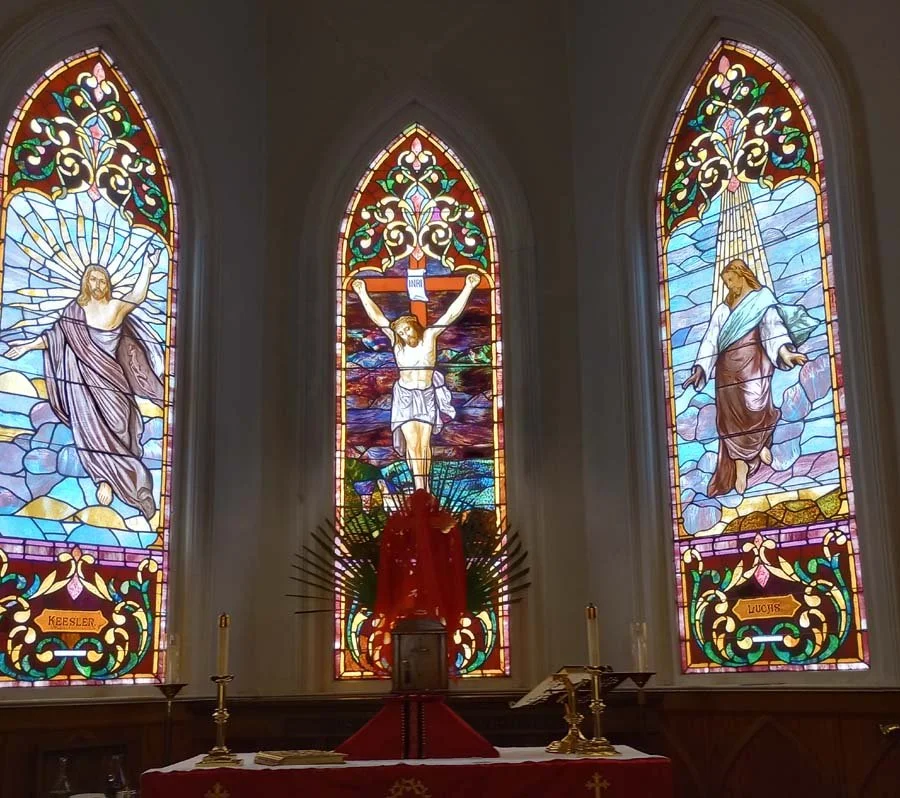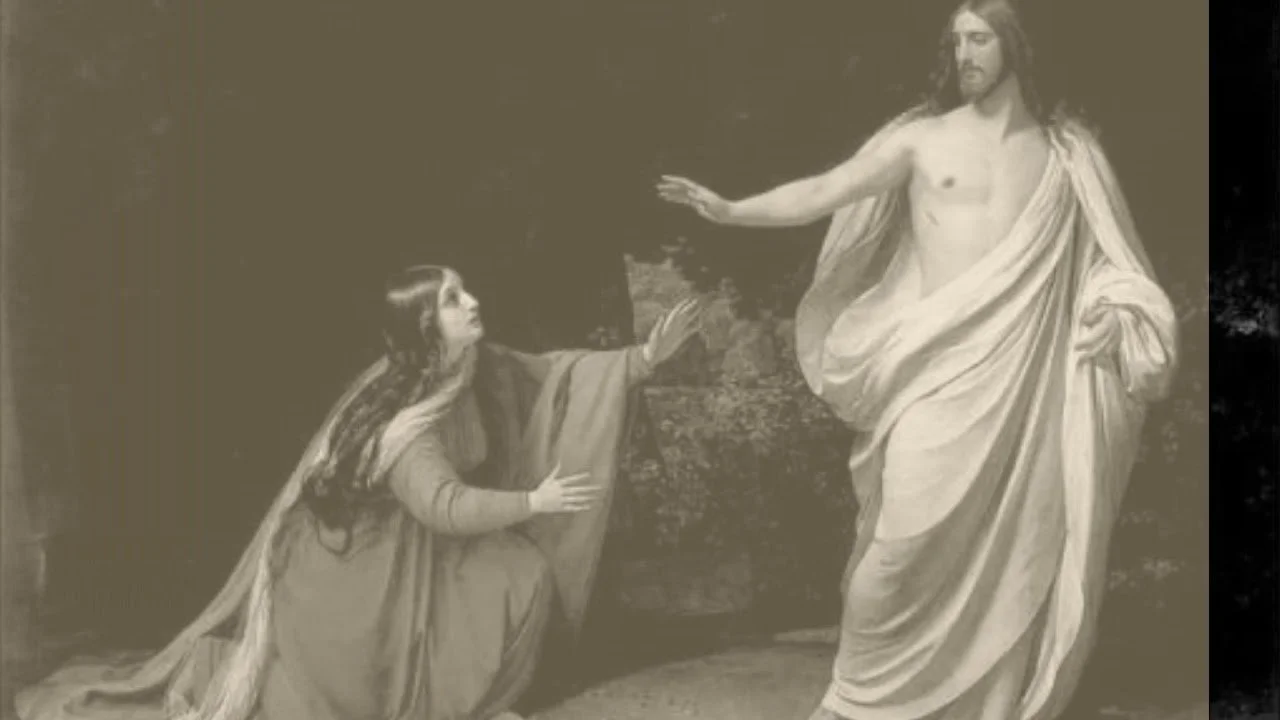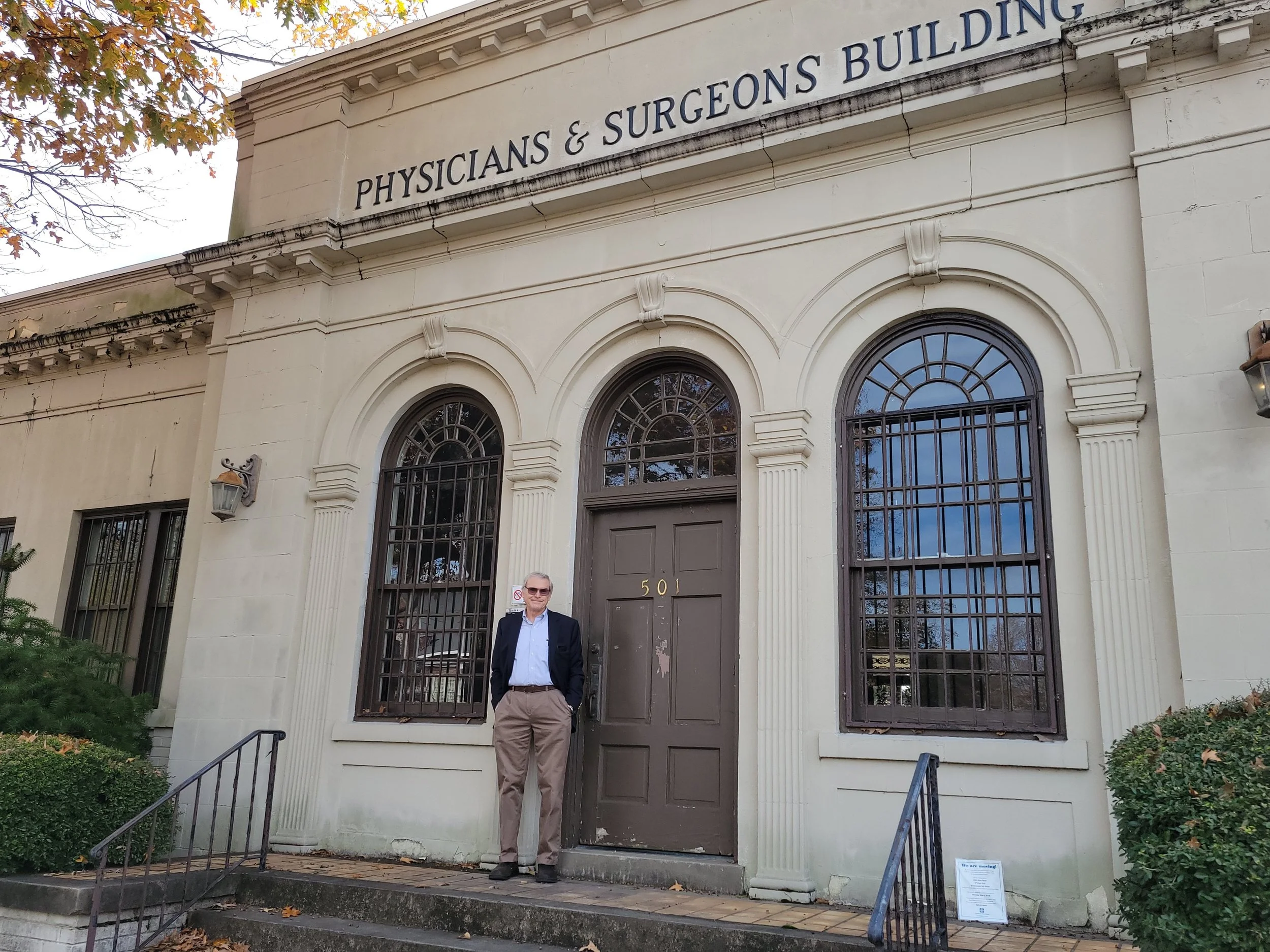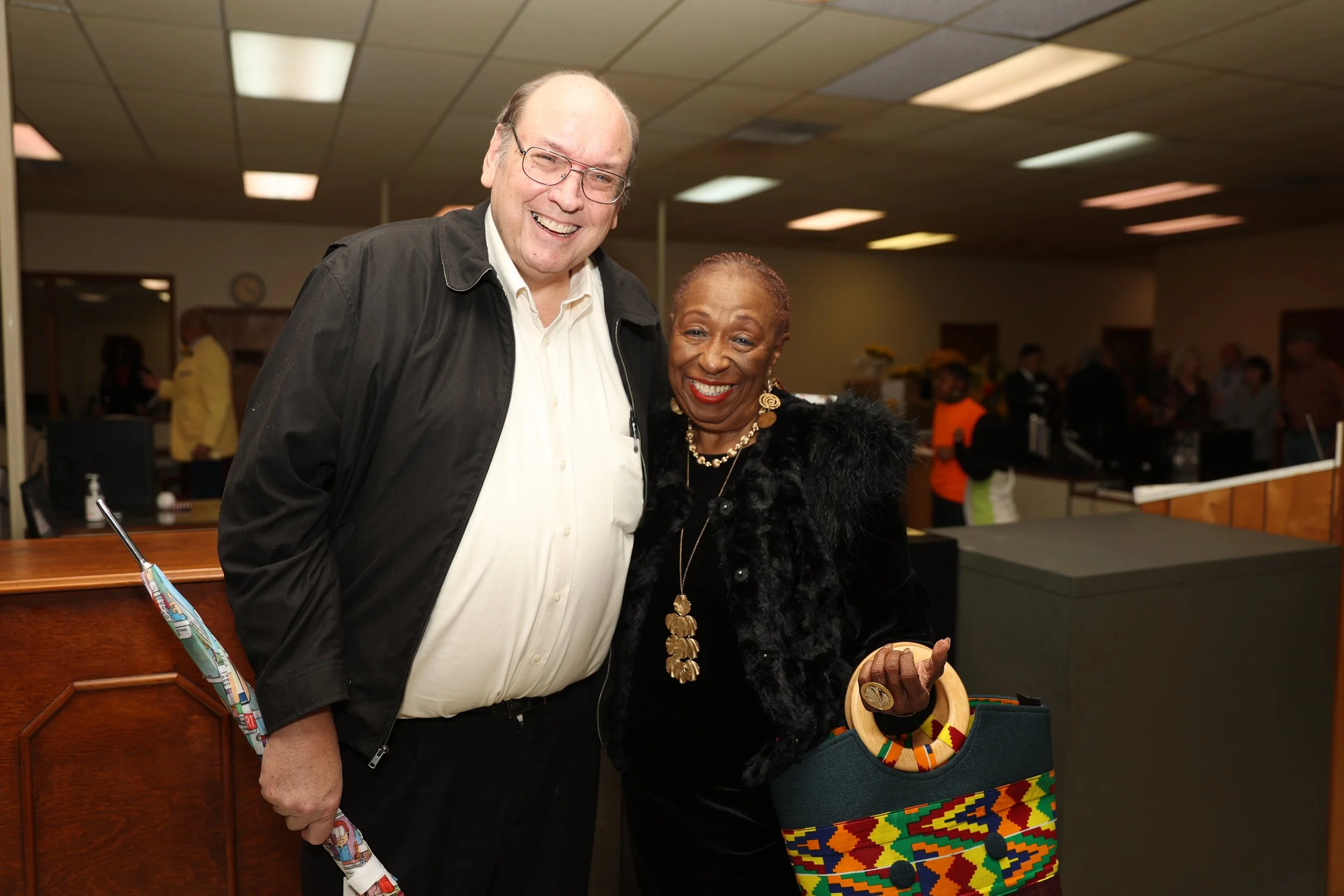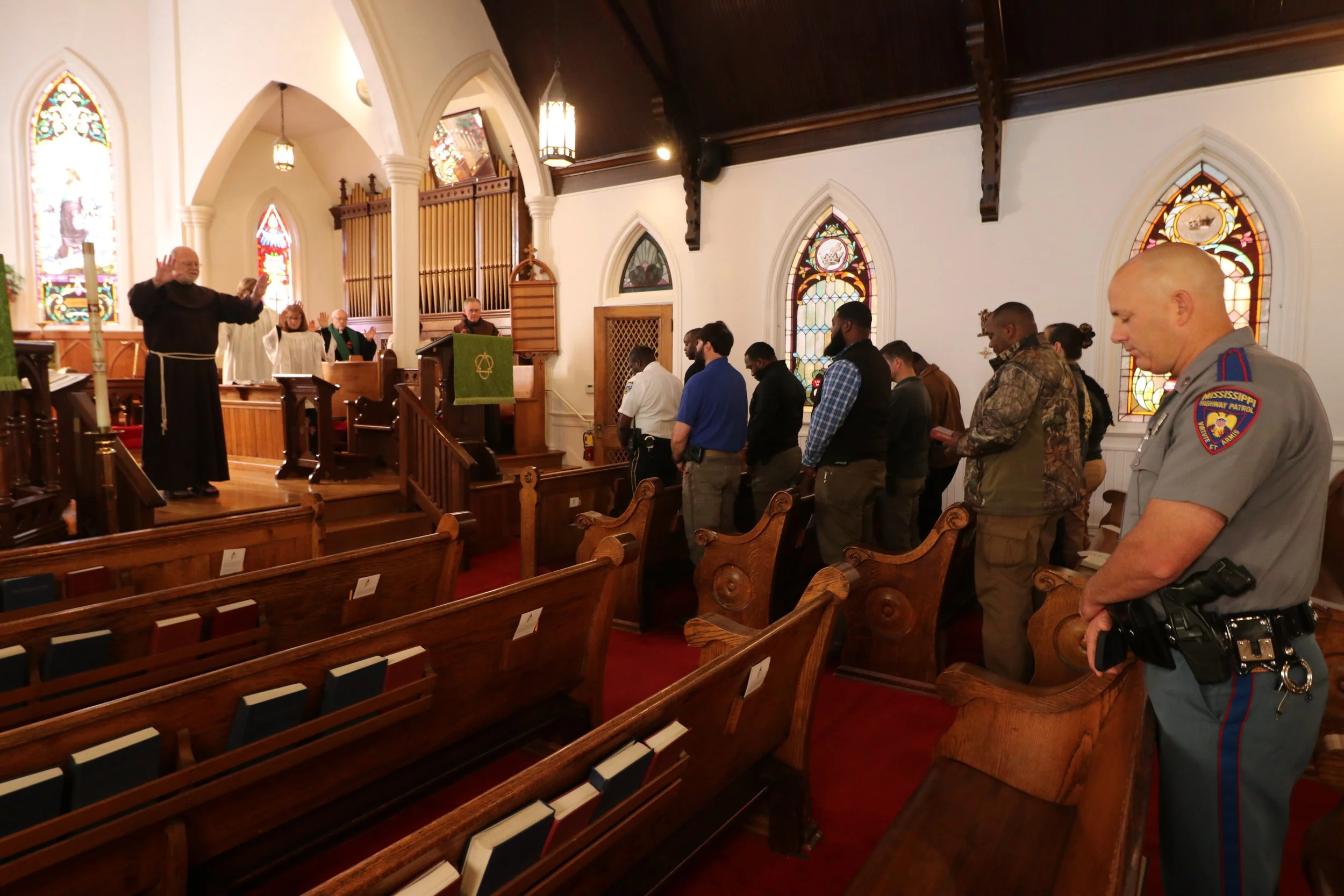2025 Nativity Scholarship Fund – Apply by April 15!
Applications for undergraduate scholarships (Fall 2025) are now being accepted through Tuesday, April 15.
Pick up a form at the baptismal font (back of church) on Sundays.
Submit completed forms to the church office by the deadline. Questions? Email cindy@nativitygreenwood.org or call (662) 453-7786.
Henry Flautt: 1933-2023: Community Servant Put Passion Into Everything
Friends and family say Henry Flautt was passionate about whatever he did, including community service, the arts and even duck hunting.
Mr. Flautt, 89, died Sunday at Indywood Glen Personal Care Home in Greenwood, where he had lived for the past several years.
Mr. Flautt was born in Glendora and grew up on his family’s Ten Oaks farm outside Greenwood. He graduated from Greenwood High School and Spring Hill College in Mobile, Alabama, before returning to his hometown.
After farming for a short time, he worked for nearly 30 years as an independent insurance agent.
He was a longtime member and leader in the Episcopal Church of the Nativity and was also active in many community organizations, including Arts for Success, the Museum of the Mississippi Delta, the Greenwood-Leflore County Chamber of Commerce, Greenwood Little Theatre, the Boy Scouts, and Habitat for Humanity.
The Museum of the Mississippi Delta honored him in 2017 for his contributions to the arts. He used his skills in pottery to make crosses and other items for many people over the years.
“It’s very gratifying when somebody wants something you create and they say it’s beautiful and they like the way it looks,” he said in a 2012 interview with the Commonwealth.
His son, Dr. Henry Flautt Jr., said his father was “very positive in everything he did” and used a “glass half full” approach to life. Mr. Flautt served as a mentor to his grandchildren and stepgrandchildren and many others and was willing to help people solve their problems, said his son, a physician who practices in Greenwood.
Among Mr. Flautt’s survivors are two children, four stepchildren, five grandchildren, seven stepgrandchildren and three great-grandchildren.
“He always was a good influence, gave good advice,” Henry Flautt Jr. said. “He was loved by many, many people in the community.”
Mr. Flautt also was part of the group that was instrumental in the construction of the building Greenwood Little Theatre used for many years.
He loved the outdoors and planted many of the second generation of trees lining Grand Boulevard, his son said.
A spiritual man, Mr. Flautt stayed active in retirement and didn’t complain when his health declined, his son said: “He just lived life to the fullest every day.”
John Doty Porter said he had known Mr. Flautt for more than 40 years and became close friends with him through duck hunting.
Mr. Flautt was more than 20 years older than Porter but was a “happy guy” who remained agile for a long time, Porter said.
“He just had such a passion for duck hunting,” Porter recalled. “He had passion for everything.”
Porter, a farmer, said Mr. Flautt once asked him to bring some red clay from land Porter rented so that Mr. Flautt could use it to make crosses. The landlords saw the crosses and were impressed that they had come from their land, Porter said.
“Probably hundreds of people have those crosses, and they were beautiful,” Porter said, adding that their style was distinctive: “As soon as you see it, you know it’s his.”
Porter said Mr. Flautt also was devoted to his church, where both men served as wardens.
“He’d do anything for you anytime, and he really enjoyed it when you asked him to do something,” Porter said.
Services for Mr. Flautt will be at 11 a.m. Saturday at the Episcopal Church of the NATIVITY, with visitation beginning in the parlor at 9:30 a.m.
Henry Flautt
Henry Flautt was a man of many passions. He loved his large family and many friends, the arts, the natural surroundings of the Mississippi Delta and the rich hunting that the region offers. In his pursuit of those passions, he was known and admired for sharing them widely with a kind and generous spirit.
Henry died Sunday, July 2, 2023, at his residence in Greenwood. He was 89.
Throughout his life, Henry was blessed with a positive attitude that attracted legions of friends.
He was a people person who thrived on news about anyone he knew. He always focused on the best in people, and he seized on opportunities to connect people who shared interests.
Frank Henry Flautt was born Nov. 26, 1933, in Glendora. As the second of five children to Thomas Joseph Flautt and Alline Mitchener Flautt, Henry grew up on his family’s Ten Oaks farm on the outskirts of Greenwood. He was an Eagle Scout before graduating from Greenwood High School and Spring Hill College in Mobile, Alabama, and then returned home to marry another Greenwood native, Polly Meek. The couple had two children, Dr. Henry Flautt Jr. (Mary Haley) of Greenwood and Frances Flautt Zook (Jim) of Oxford, before going their separate ways but remained lifelong friends. Henry farmed for a short time before working for nearly 30 years as an independent insurance agent serving the Delta.
Henry married Gayle Stribling Clements and became a beloved father figure to Gayle’s four children and seven grandchildren. The couple enjoyed a life marked by a love for travel and the arts. Through study and much practice, Henry developed an outstanding talent for ceramics. His bowls and Celtic crosses became popular gifts for family and friends who married or had a newborn. His talents and desire to teach others inspired many in the Delta to take up pottery.
When he wasn’t traveling, Henry gave much of his time and talent to the city of Greenwood. He was an instrumental figure behind the Arts for Success program, which gave loyal youth the opportunity to experience the joy of creating art. He planted thousands of trees in and around Greenwood, offering to plant trees up and down Grand Boulevard for any homeowner who wanted them. Diners at Giardina’s can still savor one of Henry’s many legacies with a serving of Uncle Henry’s Duck Gumbo.
The Museum of the Mississippi Delta honored Henry in 2017 for his many contributions to the local arts scene. He was also involved in the Greenwood-Leflore Chamber of Commerce, Greenwood Little Theatre, the Boy Scouts, and Habitat for Humanity. He was a longtime member and leader in the Episcopal Church of the Nativity.
In addition, Henry loved to share the natural beauty of the Delta with family and visitors through duck hunting. He cherished the chance to introduce the challenge of the hunt to his grandchildren, whom he rewarded for bagging a duck with a little hit of peach schnapps. He enjoyed nothing more than to climb in his pickup and cruise the back roads of the Delta while enjoying a leisurely visit with family or friends who rode along.
Henry is survived by his two children; four stepchildren, Cathy Clements Bailey (Clinton), Susan Clements Chick (Jim) and Ann Clements Carter (Bobby), all of Memphis, and H. Ganes Clements of Greenwood; two brothers, Tom Flautt of Cincinnati and Jimmy Flautt of Brandon; a sister, Joanne Flautt Branham of Greenwood; an uncle, Frank Mitchener of Sumner; five grandchildren, Mary Steele Flautt Mock of Savannah, Texas, Katherine Flautt Russell of Jackson, Suzanne Alline Flautt of Jackson, James Randolph “Jack” Zook III of Austin, Texas, and Henry McWillie Zook of Oxford; seven stepgrandchildren, Henry Clements Bailey, Clifton Clements Odom, Irene Annelle Bailey, Charles Stribling Odom, Andrew Clements Odom, Matthew Ganes Clements and William Stribling Clements; and three great-grandchildren. He was preceded in death by Gayle and his brother, Pat Flautt of Dallas.
Services will be held this Saturday, July 8, at the Episcopal Church of the NATIVITY in Greenwood at 11 a.m. A visitation will precede the service in the church parlor starting at 9:30 a.m.
Memorials can be directed to Delta Wildlife or Boy Scout Troop 200 in Greenwood by contributing to @boyscoutstroop200 on Venmo.
Norma Rochie Whittington Lawes
Norma Rochie Whittington Lawes, Ph.D., 88, of Greenwood died on May 3, 2023, at St Dominic’s Hospital in Jackson.
Dr. Lawes was born in Centreville and raised in Waxhaw. She graduated from Gunnison High School in 1951 at the age of 16. She graduated from Mississippi State College for Women with a Bachelor of Arts in 1955 and from Delta State University with a Master of Arts in 1978, and in 1984, at age 49, she graduated from The University of Mississippi with a Doctor of Philosophy degree.
Rochie dedicated her life to teaching. While still a student, she taught patients at the TB sanitarium. After college, she taught programming for IBM for several years. Later in life, she taught English in the Cleveland Public Schools and also served as an adjunct instructor in the English department at Mississippi Delta Community College. Following her retirement, Dr. Lawes taught mathematics as an adjunct instructor for Mississippi Delta Community College.
She is survived by son Philip Lawes and his wife, Kimberly Lawes, of Greenwood; daughters Carole Lawes Sawada and her husband, George Sawada, of Birmingham, Alabama, and Sally Lawes of San Diego; grandchildren Jackson Garrett of Birmingham and Jacob Lawes of Greenwood; and sisters Betty Whittington Mullens of Nashville, Tennessee, and Nona Whittington Tindall of Atlanta.
Services will be at 1 p.m. Saturday at the Episcopal Church of the NATIVITY in Greenwood. Fr. Don Chancellor will officiate. Interment will follow in Shelby Cemetery in Shelby. Visitation will be from noon to 1 p.m. Saturday at the Episcopal Church of the NATIVITY.
Pallbearers will be Jacob Lawes, Jackson Garrett, George Sawada, Seth Wheatley, Lee Tindall, Whit Tindall and Bobby VanDevender.
Memorials may be made to the Shelby Cemetery Association, The Episcopal Church of The NATIVITY or a charity of the donor’s choice.
Greenwood Delta Funeral Home (www.greenwooddeltafh.com) is in charge of arrangements.
Bridge To The Past: Card Game Pays Tribute To Beloved Player
A game almost two years in the making took place Monday afternoon at the Episcopal Church of the Nativity in memory of James Harold Middleton.
Middleton, a Winona native who died in 2021, taught or influenced the majority of about two dozen people who gathered to play bridge, said Liz Mounger, who also learned from Middleton.
James Tullos, who lives in Brandon but knew Middleton, said he was asked after Middleton’s death if he would organize a game of duplicate bridge in Middleton’s honor since that was Middleton’s game.
“One of the things that makes duplicate bridge special is the relationships it builds,” he said. “There are people playing from all walks of life.”
Middleton’s widow, Gloria Middleton, also played in Monday’s game.
“It’s very meaningful for me,” she said, “This is the first time I’ve been back since my husband’s death, and it’s been good to see old friends and play bridge again.”
Mr. Middleton became active in playing duplicate bridge after he retired as state director of the U.S. Social Security Administration. He along with Joseph Dehmer of Jackson attended more than 88 tournaments all over the country. Mr. Middleton attained the rank of Silver Life Master and was renowned for his ability to teach the game.
Dr. Mike Carter, a retired ear, nose and throat doctor who was Middleton’s bridge partner for over 30 years, used to travel with Middleton all over the country to play the game.
“They’d just go off to Gatlinburg for a week, and I remember one time, James got tired and went to bed, and Mike just found another partner,” said Mounger, who was at Carter’s table.
Tullos said the social nature of bridge is what makes the game and gathering special. Greenwood’s Duplicate Bridge Club has brought people together since the early decades of the 1900s but almost ceased to exist in the 1990s until Mary McNeil, who was 80 at the time, reorganized and directed the club.
The club’s challenge, then, is similar to the problem Wes Clemons, one of the players, said bridge clubs in general are facing now: how to attract younger members.
“There are a lot of different reasons people play,” he said. “For example, it’s mentally stimulating and provides a social outlet — I think that’s why most of us that are here like to play — and studies show that it may help prevent Alzheimer’s as we age. But the decline in the population of bridge players is a challenge because people who play bridge tend to be of a certain generation,” he said.
Good Friday Pilgrimage Set
The community is invited to walk with local churches Friday along a pilgrimage through downtown Greenwood in recognition of Good Friday.
The Rev. Don Chancellor, the rector at the Episcopal Church of the Nativity, has been working with other area churches to organize the event, which will begin at 1 p.m. Friday in front of the Episcopal church.
“Because this was a normal practice for me, I thought I’d invite others,” he said. “We’re all looking for a way to show visible unity, and we’re hoping it can be an opportunity — and, hopefully, a tradition — where Christians can at least come together publically in both our sinfulness and faithfulness.”
He said he has had informal discussions over the last several weeks with the Rev. Ruth McKinney of Wesley United Methodist Church, Dr. Montrell Greene of Sycamore Street Church of Christ, the Rev. Scott Wright of St. John’s United Methodist Church and others about the pilgrimage.
The walk will follow the Stations of the Cross, a traditional Good Friday practice established in the early church.
The 14 stations along the pilgrimage follow the story of the passion of Christ, beginning when he is condemned to die and ending when he is laid in his tomb.
Each stop will offer a chance for those present to pray and meditate in preparation for Easter Sunday. Chancellor said the pilgrimage fills in the time in between those stations and allows those who participate to reflect on the actions represented and “live in the tension” of the finality of the last station.
“What this does for us spiritually is to allow us to stare with some clarity at the sacrifices made on our behalf and think about what the world could have been like without the resurrection,” he explained.
Chancellor said he expected several churches to participate but did not know how many people would make the pilgrimage.
“My hope is that, by coming together and walking the way of Christ together, we will be helped in seeing each other in a context that promotes unity,” he said.
If it rains, the Stations of the Cross most likely will be set up in the Episcopal Church of the Nativity, but Chancellor is hopeful that it can proceed outdoors. “The great thing about it being outside is that it allows you to take the time to reflect, as you walk, on the process,” he said.
Choir Corner: Healy Willan and Missa de Sancta Maria Magdalena
David Williamson, Organist and Choirmaster
By David Williamson
Some of you have noticed that we switched service music, or the Ordinary of the Mass, for Advent. We will continue with it through the Christmas season, including the late service on Christmas Eve, when we substitute the Gloria in Excelsis for the Kyrie. (According to the rubrics, the Gloria is not said or sung in Advent or Lent.). The setting is the glorious 1928 Missa de Sancta Maria Magdalena by Healy Willan 1880-1968.)
Willan was born and educated in England and moved to Canada in 1913. He composed and taught at the Royal Conservatory and earned enough from his composition royalties to leave the more prominent St Paul’s Bloor Street in 1921 for the smaller St. Mary Magdalene, which was High Church. The mass setting was named for the church. A former rector’s wife grew up in that parish, and when her family visited, I asked about his time there. He paid for the music budget by charging his singers!
In his sacred compositions, he was of that generation influenced by both the high church movement and looking back at earlier styles of music from pre-Baroque to plainsong chant.
His limericks were said to be wonderful! He’s famously quoted as saying he was “English by birth, Canadian by adoption, Irish by extraction, and Scotch by absorption.” He was the Dean of Canadian composers and was commissioned to write an anthem for the 1953 Coronation of Queen Elizabeth II. In 1989, Queen Elizabeth the Queen Mother unveiled a plaque in his memory at the church.
We have a few pieces in the choir library and sang his Advent anthem, “ Rejoice O Jerusalem, behold thy King Cometh,” on the first Sunday of Advent. I probably play more hymn-based voluntaries by him than any other composer.
In The Hymnal 1940, this setting was the Second Service and was the most frequently used service music in most congregations. If you’re not as familiar with this setting, there are several YouTube videos of it.
Boys And Girls Club Administrative Offices Relocating To Notable Greenwood Site
The Boys and Girls Club of the Mississippi Delta will soon move its administrative offices into a historic Greenwood building that housed three generations of doctors. Lucas III and Dallas both attend the Episcopal Church of the Nativity.
The Boys and Girls Club of the Mississippi Delta will soon move its administrative offices into a historic Greenwood building that housed three generations of doctors.
The club, which operates seven locations in the Delta, is in the process of purchasing the Physicians and Surgeons Building from Greenwood physician Dr. John F. Lucas III.
The building has been owned by Lucas III’s family since 1939 when his grandfather, Dr. John F. Lucas Sr., purchased it three years after starting his practice in Greenwood.
A doctor with the name Lucas practiced in the building until 2019, when Lucas III’s practice moved inside to Greenwood Leflore Hospital.
“I’m delighted that it’s going to be used and I think they’ll be good stewards of the building and they’ll take good care of it,” Lucas III said. “The Boys and Girls Club is a great organization and do great work. I’m pleased that they’re able to carry that on.”
David Dallas, the club’s executive director, and Cameron Abel, a member of the club’s board of directors, both said a long-term goal of the club was to secure an office the club could own rather than rent.
“It’s expensive to rent space and that’s just money we don’t see again,” Dallas said. “This is actually a nice way to invest for us.”
Founded in 2002 in Cleveland, the club’s administrative office is currently housed in Yazoo City.
Abel said the move makes financial sense and was a great opportunity.
“A lot of that has to do with it makes it more central to all the sites that are currently being run through the organization,” he said. “It just makes tactical sense to relocate.”
He said a move became possible when the club was informed by the Boys and Girls Club of America that the Delta organization had received a donation from MacKenzie Scott, who Abel said had identified the group specifically for the donation.
“When we got this donation, one of the things I felt like we could do was actually purchase a building,” Dallas said.
In 1929, the Physicians and Surgeons Building located at 501 W. Washington St., then owned by Dr. John Preston Kennedy, opened and was featured in the Commonwealth in June of that year.
“On the corner of Washington and Henderson Streets,” the story reads, “beautiful in its architectural simplicity, solid and staunch in its structural make-up, Dr. Kennedy’s Physicians and Surgeon’s building is the latest to denote the progression that embodies not only building construction but the advancement of the science of healing.”
The story lauded the building as housing “some of the most widely known and efficient practitioners in Greenwood.”
Just four years later, Kennedy would die and set off one of Greenwood’s most sensational stories.
In 1933, Kennedy had been living at a house owned by August Thalheimer since Kennedy separated from his wife a year earlier. He had become romantically involved with another doctor, Sara Ruth Dean.
On the night of July 28, Thalheimer discovered Kennedy in distress. Over the next few days, Kennedy’s condition worsened, and he admitted to his attending physician, Dr. George Baskerville, that he believed he may have been poisoned with mercury.
On Aug. 2, Kennedy, who was nearing death, told his brothers he believed he had been poisoned by Dean on the night of July 27 when the two had met at the Physicians and Surgeons Building. Kennedy said he told Dean he planned to reconcile with his wife. He said he tasted a “metallic taste” after the two shared one more glass of whiskey before departing.
Dean was indicted on murder and she was found guilty on March 2, 1934, though she was pardoned by Gov. Martin Sennett Conner.
Urologist Thomas J. Weldon, who spent several years working at the Greenwood Urology Clinic, became fascinated with the case and eventually came to have doubts about Dean’s guilt.
“All the evidence was circumstantial; that autopsy wasn’t really an autopsy; and Kennedy’s deathbed deposition? Nowadays that wouldn’t even been accepted as evidence,” he said in 2009.
It was in 1936 where a more familiar history of the Physician and Surgeons Building started. It was that year that Dr. John F. Lucas Sr. moved with his family to Greenwood and his OBGYN practice to the building.
Lucas Sr. would purchase the building in 1939.
His son, Dr. John F. Lucas Jr., known as John Fair, joined him at the building in 1963.
“They had different practices. My grandfather was obstetrics and gynecologist. My dad was a general thoracic surgeon,” said Lucas III. “They had some overlap and practiced in the same building.”
Lucas III, a nationally recognized vascular surgeon, moved his practice to the building in 1988.
He remembers spending much of his childhood in the building.
“It smelled like a doctor’s office,” he recalled. “It was that alcohol smell. Back then, they had glass syringes and they had needles that you reused and re-sharpened so they were all metal instead of metal and plastic. You didn’t have the plastic or rubber syringes. They were glass so you had to re-sterilize things and they didn’t really have autoclaves for offices so everything is soaked in alcohol.”
Since his practice left the building in 2019, it has remained vacant. In the television series “Women of the Movement,” which tells the story of the fallout of Emmett Till’s murder, the building was used for several locations, including serving as the Cook County Hospital in Illinois.
Lucas III said he still has a few medical records to dispose of. Dallas said the club hopes to have renovations for the building done so the club can move into the building by June.
Aside from a personal relationship — Lucas III and Dallas both attend the Episcopal Church of the Nativity — Dallas said he and the board recognized the building is in a great location.
“It was definitely a building that people would identify with in this community,” Dallas said. “It has such a rich history.” Dallas hopes to hire five full-time positions for the office.
Abel said the building was perfect for what the club will use it as — not too small and not too big for administrative offices.
In the west wing of the building remains a large brown desk that was used by Lucas III’s grandfather, Lucas Sr. Lucas III said he doesn’t have room to take it himself and is going to see if any of his siblings can take possession of it.
“If not, if David Dallas and the Boys and Girls Club can put it to use, I’d be willing to donate it to them,” he said.
Robert Morgan Darden
Bob passed away at his home of complications from non-alcoholic cirrhosis on Oct. 11, 2022, while under hospice care. He was 63.
A memorial service for Robert Morgan Darden of Cruger is planned for 1:15 p.m. Saturday, Oct. 29, at the Cruger Baptist Church in Cruger, with the Rev. Al Different officiating. Earlier in the day, Mr. Darden’s ashes will be interred in the columbarium at the Episcopal Church of the Nativity in Greenwood in a private family service.
Bob passed away at his home of complications from non-alcoholic cirrhosis on Oct. 11, 2022, while under hospice care. He was 63.
Born on June 7, 1959, in Washington, D.C., to Frances Estes and Elwyn Jones Darden of Arlington, he graduated from George Mason University in Fairfax, Virginia, with a Bachelor of Science degree in police science.
During summers as a child and teen, Bob spent as much summer vacation time as he could visiting his maternal grandparents, Etoile and Marion Estes, on their farm, Elmwood Plantation, in Cruger. After his father and his mother had passed, Bob felt an increasingly strong pull by both the farm and the small town where he had done his summertime growing up and all the neighbors felt like family. In 1992, his grandmother died, leaving Elmwood to Bob and his brother and sister, and in 1994, Bob decided to move into his grandmother’s home in Cruger, which she left to him, and maintain the family farm.
In 2000, to supplement his farm income, Bob started as a staff writer for The Greenwood Commonwealth, where he worked for more than 17 years, making lasting friendships with co-workers and newsmakers alike. He was hired by Life Help as a peer support specialist in 2020, a job he held until his passing.
Bob met his wife, Jo Alice Hughes, in 2004, when she joined the Commonwealth as lifestyles editor. The couple was married in 2007.
On Sept. 11, 2022, Bob officially joined the Cruger Baptist Church, whose founding members included his Estes grandparents.
Bob was preceded in death by his parents and his Estes grandparents, as well as his paternal grandparents, Josie Jones and George Leslie Darden of Hernando.
He is survived by his wife; his sister, Marion Darden Reed, of Arlington; his brother, Elwyn LaBauve Darden of Woodbridge, Virginia; nephews Jonathan Darden Reed and Michael Andrew Reed, both of Arlington; niece Rachel Margret Reed (Matt Baggette) of Alexandria, Virginia; niece Christine Darden Wayenberg (James) of Fort Belvoir, Virginia; niece Natalie Darden of North Hollywood, California; sister-in-law Mary Johnson Hawkins of Greenwood; and nieces Cary Hawkins New (Noah) and Keely Hawkins Harrison (Trent), all of Greenwood.
Also included as Bob’s survivors are members of his “chosen family”: lifelong friend Chris Purcell of Warrenton, Virginia, and his wife, Teresa; “Mama” Nell Snyder of Calhoun, Georgia; “sisters” Laine Flemming Hutton of Tchula and Sarah Flemming Upchurch of Greenwood; “cousin” Marilyn D’Isepo of Clinton; Brother Al Different of Cruger and his wife, Kim; Jonathan Grantham and his team at Life Help; Dorothy Robertson of Life Help; Tim Kalich of the Commonwealth and his wife, Betty Gail; Susie Davis of Cruger; Henry “Brother” Gordon of Kosciusko, formerly of Cruger; and farmer Jim Thomas of Egypt and Jackson and his wife, Martha.
Special thanks for the weeks of loving care and unflagging support go to the angels on Bob’s AccentCare Hospice team: Chris Accardy RN, Alissa Brown RN, Courtney Pate CNA, social worker Jackie Box and Chaplain Brother Howard Beam.
In lieu of flowers, donations may be made to Cruger Baptist Church, 14538 Main St., Cruger, MS 38924.
First Responders Blessed
First responders from the Greenwood Police Department, Mississippi Highway Patrol and Alcohol Beverage Control received blessings from religious leaders Wednesday at a special service hosted by the Episcopal Church of the Nativity.
First responders from the Greenwood Police Department, Mississippi Highway Patrol and Alcohol Beverage Control received blessings from religious leaders Wednesday at a special service hosted by the Episcopal Church of the Nativity.
The service came about as a result of a conversation between Don Chancellor, the church’s rector, and Greenwood Police Chief Terrence Craft about two months ago, Chancellor said.
The blessing was given in step with the Feast of St. Michael, which traditionally takes place on Oct. 29, but Chancellor said he will be out of town that weekend, so the ceremony was held Wednesday.
Michael is the patron saint of chivalry as well as of the police, paramedics and the military. He is ascribed four roles in church tradition, Chancellor said.
The archangel “combats evil, escorts the faithful to heaven, is the champion and protector of the church and the faithful and calls us before the judgment,” Chancellor explained.
He drew parallels between Michael’s service and that of first responders.
“You protect and are often the person there when someone is called to heaven or hell. You are champions for the community, and — unfortunately — sometimes have to call people to judgment,” he said.
He emphasized the weight these responsibilities bring to the jobs of first responders and encouraged officials to rely on the church and God to keep their souls and bodies well.
“The church can be partners,” he said. “St. Michael will support and protect you. We pray for you in the midst of all uncertainty that you will know good and evil, and you will know what to do.”
The Rev. Joachim Studwell, pastor of St. Francis, gave the blessing that ended the service. “Pour forth the balm of mercy,” he prayed. “Give wisdom, insight and quick discernment. Let them see situations how you see them. In any discouragement, let them know your courage, and in any frustration, let them know your grace. By intercession of the archangel Michael, protect them.”
Hilary Brzezinski, the Catholic church’s assistant pastor, said he hopes the blessing service “will bring attention to the struggle with growing violence and our need to support officers who serve and protect the community.”
Jeri Bankston, patrol captain for the Greenwood police, said she hopes officers take from the service a sense that they are supported and have someone to whom they can talk if they have a need.
“We don’t always see law enforcement in a positive light,” said Stephen Hale, interim pastor at First United Methodist Church, “and we want to bring this event to support unity that does and should exist between first responders and the community,”
Studwell included families in his blessing. “We are also praying for the families, that people don’t feel isolated. A lot of them feel they have to build a shield around themselves, and we want them to know they don’t have to do it alone,” he said. “We want to do something positive together in the face of growing stress,” Brzezinski added.

